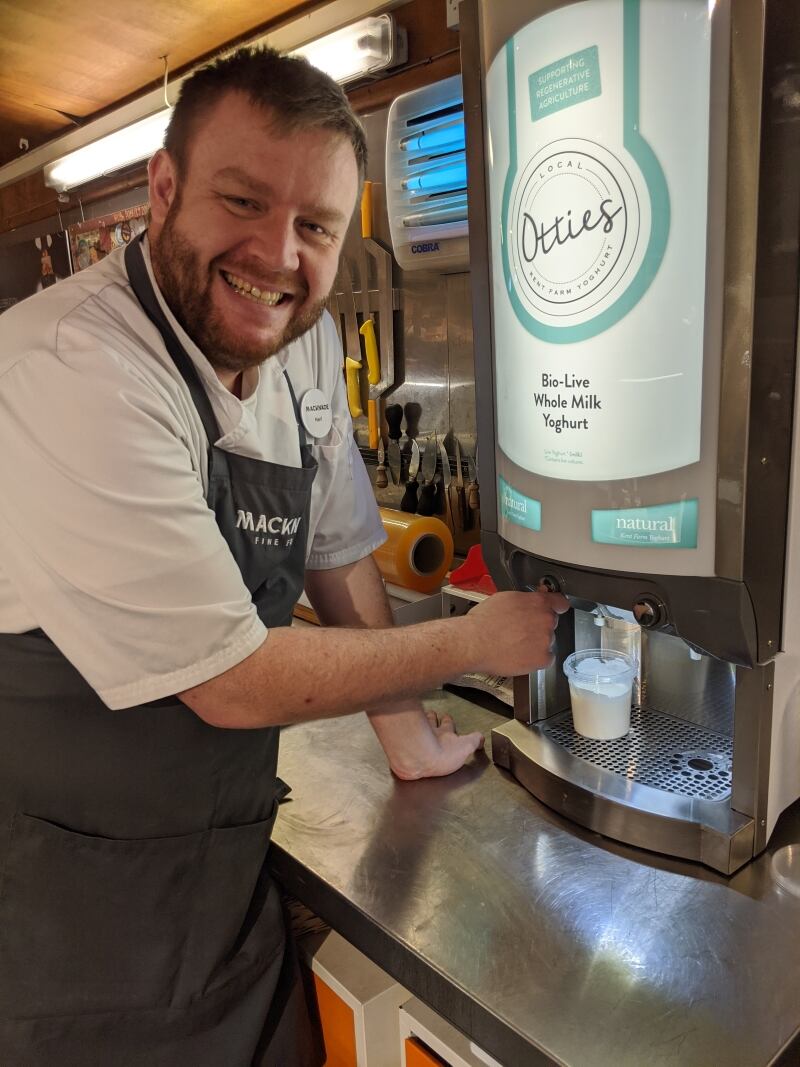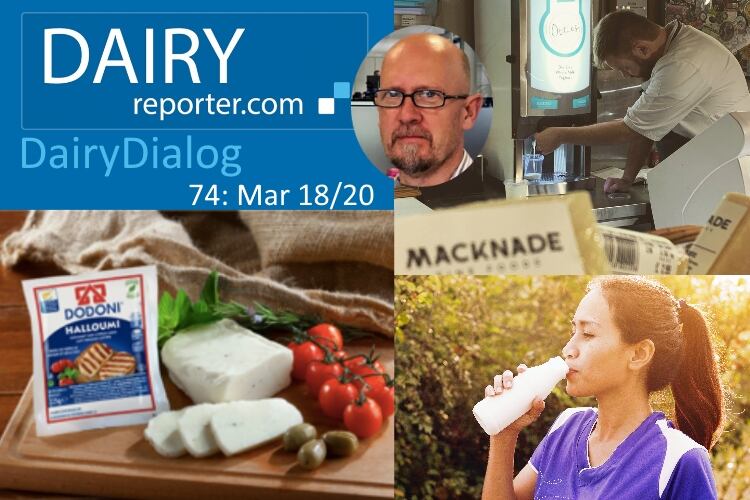We speak with Tom Seepers, CEO of Dodoni, about halloumi; Emmanuel Michelot, launch manager at Novozymes, regarding the company’s newest launch, Saphera Fiber; and David Guy, owner of Otties yogurt, about the company’s yogurt dispenser, which is reducing plastic packaging.
New lactase to improve nutritional profile of dairy products
Novozymes is launching Saphera Fiber, a lactase enzyme to increase content of fibers while also reducing sugar in fermented and non-fermented dairy products.

At the same time, a recent study testifies that 59% of consumers are more likely to buy dairy products with higher fiber content, and 38% of them are willing to pay more for a higher content of fiber in their dairy products.
“Saphera Fiber is a new lactase that has been developed to help dairies bring new innovation to the market as it enables development of products with nutritional claims. Being a biological solution, it also makes possible to manufacture dairy products in a sustainable way with less use of artificial or chemically produced ingredients,” Emmanuel Michelot, launch manager at Novozymes, said.
The new lactase enzyme works by converting lactose contained in the milk into GOS fibers (galactooligosaccharides). It does so without reducing the natural sweetness of dairy products.
GOS fibers derive from the lactose in cow’s milk and is often associated with improved digestive health.
Consumers care about health, and they are willing to pay more for dairy products with nutritional claims, the survey finds.
“With Saphera Fiber, dairies can open the door to new innovation and new markets as it enables them to develop the new type of products consumers are asking for,” Michelot said.
“Saphera Fiber is a new move into this frontier: It’s a lactase that provides innovation opportunities for brands to combine fiber claims in reduced sugar product formulations.”
Novozymes launched Saphera in 2016, a lactase enzyme that set a new standard for the production and quality of lactose-free products. It was a major innovation within the growing industry of free-from dairy products.
Saphera and Saphera Fiber have different functionalities
Michelot told DairyReporter Saphera is used for the production of lactose-free dairy products. It is also used to produce dairy products with less added sugar. The lactase hydrolyses the lactose into glucose and galactose creating sweetness that can be used to remove some of the sugar added in sweetened dairy products.
Facts about Saphera Fiber
• Saphera Fiber is a beta-galactosidase (lactase) enzyme that converts lactose, the sugar inherently in milk, contained in the milk into GOS fiber.
• 45% of the lactose contained in fluid milk is converted into GOS, and 25% is GOS Fiber
• 1.2% GOS fiber formed in fluid milk allowing fiber claim and 25% sugar reduction
Saphera Fiber is used for the production of fiber-enriched dairy products. The reaction converts the lactose into GOS fiber, Michelot said. The reaction will simultaneously increase the fiber content while reducing the sugar content of dairy products.
“What is important is to understand that Saphera can only reduce the added sugar and Saphera Fiber reduces only the non-added sugar (lactose),” he explained.
DODONI halloumi launches in Marks & Spencer’s in UK, as Cypriot halloumi regains its trademark
The leading dairy company in Greece, DODONI, has announced its top of the range feta and halloumi are now available in more than 200 Marks & Spencer’s stores across the UK.
Following recent news confirming that the exclusive trademark for halloumi in the UK has been restored, giving Cypriot farmers an exclusive right to market their cheeses using the ‘halloumi’ description, consumers can now be sure the products they buy are authentic and made in Cyprus.
Produced near Limassol, in Cyprus, DODONI halloumi is made using traditional Cypriot cheese-making methods with a distinctive flavor deriving from the exclusive use of 100% Cypriot cow, sheep and goat milk.
Protein-rich halloumi has become a popular cheese around the world and with a consumption of close to 17,000 tonnes, the UK is the largest halloumi importer in the world. Exports from Cyprus have grown by more than 20% per annum in recent years.
Tom Seepers, CEO of DODONI, said, “As a leading producer of Greek and Cypriot dairy products, at DODONI we welcome the news that the halloumi trademark is back where it belongs. We collect milk from local farmers and use traditional recipes to make our halloumi the way Cyprus has always made it – so it is important to us that consumers are able to tell the difference.
“Now that the trademark is Cypriot again, this has been made easier and the consumer is guaranteed the experience that they expect, and be assured that they can enjoy quality, authentic halloumi from Cyprus.”
DODONI products are exported to more than 50 countries worldwide. In 2019, DODONI had a share in Halloumi exports of 12%.
Otties launches UK’s first yogurt dispenser
Macknade becomes the first outlet in the UK to have an Otties Swiss-style yogurt dispenser recently.
The yogurt dispenser offers a drive towards sustainability, encouraging shoppers to refill their own vessels, and delivers around a 70% reduction in plastic comparative to individual yogurts pots.
Customers can pick up a pot in the store or bring their own containers for the delicatessen team to fill up and price according to weight. There are already plans to roll a machine out to a second Macknade site in Ashford, Kent.

David Guy, owner of Otties, added, “We chose to partner with Macknade for this launch as it offers a shopping experience that is tuned into local farming and local producers. The delicatessen is exceptional, and provenance and sustainability are so key to their offering.
“We are the last family-run dairy farm in the Elham Valley and are based in south east Kent. Due to the pressure on dairy farms over the last few years, we decided to diversify into yogurt and we have created a really fantastic high quality Swiss-style yogurt, which we’re really proud of. This is the future of yogurt as it offers a far more efficient production process and vastly reduces the plastic required.”
Stefano Cuomo, managing director of Macknade, said, “It’s really important for us to support the growth and reach of local businesses and this is just one example of the relationships we cultivate. Not only are we confident that we are offering a premium yogurt product to our customers, it is also helping us to meet our own goals of reducing the packaging and waste produced by the business. Not to mention that it tastes incredible.”

